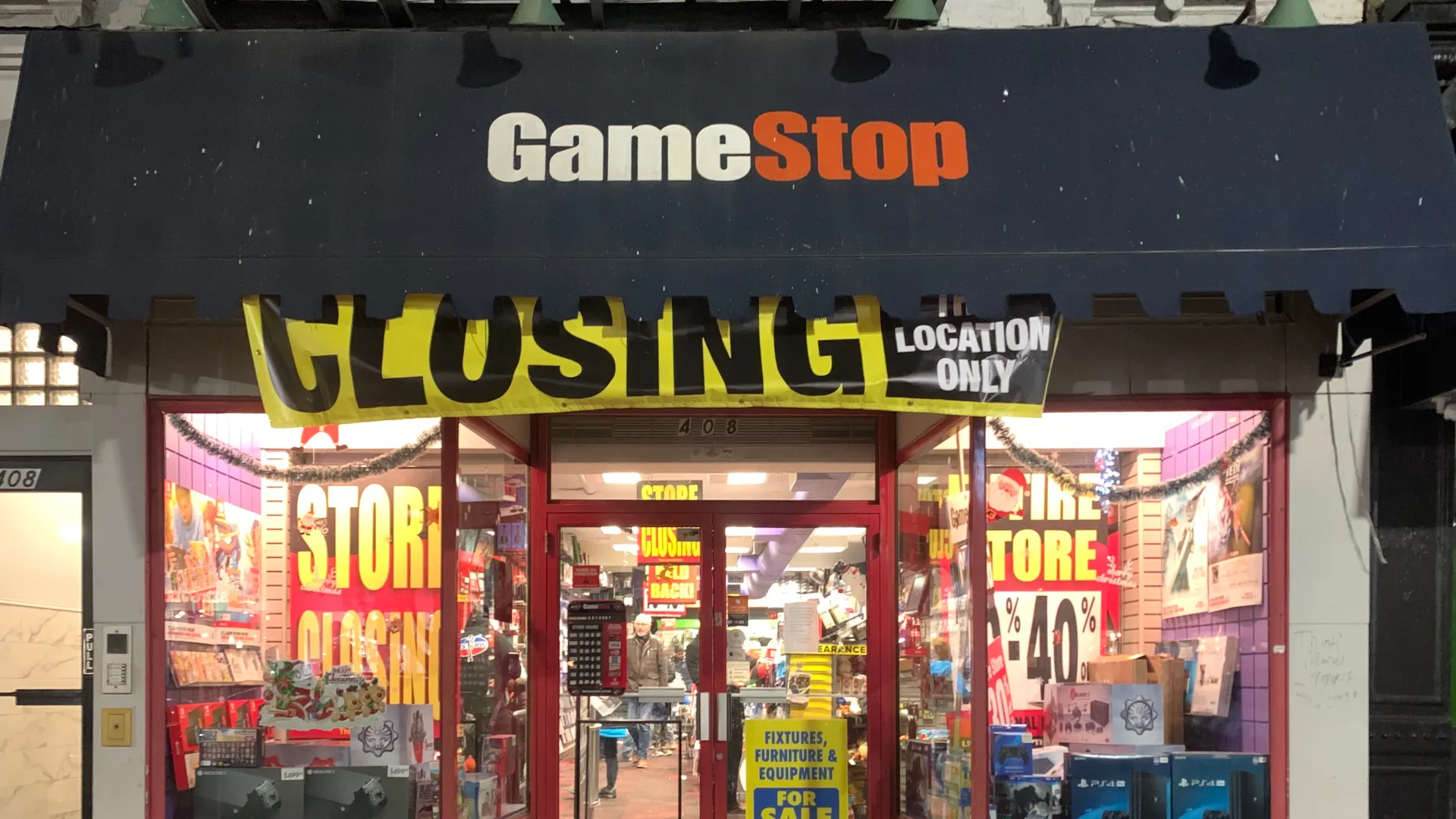GameStop has given up on NFTs.
Less than three years after first hinting at its interest in NFTs, GameStop has ditched its NFT marketplace. As announced in January, the platform is no longer functional for buying and selling assets as of February 2, though it is still viewable online.
The game retailer, which began as a U.S.-based brick-and-mortar operation back in 1984, has recently struggled to maintain a profitable business. GameStop was profitable for the first time in years in late 2022, but this followed company-wide layoffs and a corporate exit from some European countries.
GameStop keeps pivoting, and the latest victim of those moves is its NFT marketplace. Here’s a look into the rise—and fall—of GameStop’s NFT plans.
April 2021: GameStop seeks a blockchain analyst
Back in April 2021, a GameStop job listing for a blockchain security analyst suggested that the retailer was planning an NFT push. A fintech recruiter told Decrypt at the time that it was likely that GameStop was planning to launch something “serious” in the crypto space because of the job listing’s security focus.
May 2021: GameStop launches mysterious site
In May 2021, GameStop shared via a minimalistic landing page that it was continuing to hire employees for its blockchain project. At the time, it was unclear if the retailer would launch an NFT collection, a token, a marketplace, or something else entirely.
This landing page contained a number of hints and Easter eggs, though, like a link to a GameStop Ethereum smart contract that had received an NFT from Immutable’s Gods Unchained card game. The teaser site also had an “endless runner” browser game hidden within it.
January 2022: Blockchain division revealed
By January 2022, GameStop had established its blockchain department and hired 20 employees to work on its then-upcoming crypto plans. GameStop’s stock surged 31% after the news broke.
February 2022: Immutable deal + $100 million fund
GameStop announced its $100 million grant fund with crypto startup Immutable in February 2022, offering disbursements of Immutable’s IMX token to developers looking to use the Immutable X blockchain and release their NFTs with GameStop.
This news also confirmed that GameStop would use the Immutable X blockchain for its then-upcoming NFT marketplace (GameStop’s marketplace also uses Loopring, another Ethereum scaling network).
The retailer had, up until this point, remained very quiet about its blockchain plans.
February 2022: GameStop sells off $47 million worth of IMX
In a somewhat awkward turn of events, GameStop plunged IMX’s price 23% in 24 hours as it sold off a staggering $47 million worth of IMX tokens. While the token disbursement was part of a prearranged deal, outsiders could view this as GameStop looking to cash out immediately and take profits on its crypto partnerships—before even launching a single crypto product.
May 2022: GameStop NFT Twitter and wallet launch
GameStop spun up a GameStop NFT Twitter account dedicated to promoting its NFT plans.
“What the internet did for communication, blockchains do for value,” GameStop’s NFT account wrote in May 2022. “Public, permissionless, credibly neutral value layers [give] power to the players,” it added, espousing crypto’s potential benefits.
At this time, however, NFT sales had hit a plateau.
GameStop also launched its browser extension crypto and NFT wallet in May 2022, and tweeted about its many different wallet patch updates throughout the year.
July 2022: Marketplace launch—and layoffs
In July 2022, GameStop ditched its CFO and laid off staff across its businesses, one month after reporting substantial losses. Days later, it launched its anticipated NFT marketplace in beta, which required NFT creators to submit applications for approval to be listed or host mints on its platform.
GameStop’s NFT marketplace also doesn’t offer any data transparency beyond the stats for its top 50 most-traded collections. The marketplace saw over 3,100 Ethereum worth of NFTs traded within its first two days of launch, which was about $3.5 million at the time. While this wasn’t much compared to the largest NFT marketplaces like OpenSea, GameStop surpassed Coinbase’s NFT marketplace effort.
The game retailer continued to encourage developers to apply to its $100 million grant program during this time.
October 2022: GameStop finally adds gaming NFTs
Three months after launching its NFT marketplace, GameStop finally added Immutable X gaming NFTs to its platform. This means that NFT items or assets from games like Gods Unchained, Illuvium, and Guild of Guardians could be bought and sold via GameStop’s NFT marketplace. Until this point, the retailer had only offered profile picture-style NFTs and art NFTs for sale on its platform.
In November 2022, GameStop furthered its crypto and NFT wallet push by releasing a version for iOS mobile devices via Apple’s App Store, according to a U.S. Securities and Exchange Commission (SEC) filing.
March 2023: SEC filing suggests minimal impact
“Our new digital asset products and services may not achieve our desired results and may expose us to new risks,” GameStop wrote in an SEC filing in March 2023 of its risk assessment of its blockchain push.
“If and to the extent we are unable to successfully implement and operate these digital assets initiatives, we may incur unanticipated costs and losses, and face other adverse consequences, such as negative reputational effects,” the company continued.
GameStop further expressed that its blockchain offerings subjected the company to risks “similar to those associated with any new product offerings, including, but not limited to, our ability to accurately anticipate market demand and acceptance, creator and buyer acceptance, technical issues with the operation of the products, and legal and regulatory risks,” per the filing.
June 2023: GameStop fires CEO
Uh oh—GameStop fired the CEO that led the company’s push into blockchain and NFTs within a year of its NFT marketplace launch.
August 2023: GameStop axes crypto wallet
In August 2023, GameStop quietly shared that it was discontinuing its crypto wallet in November due to the “regulatory uncertainty of the crypto space” via a pop-up message on its NFT marketplace’s website.
Around this time, high-profile crypto lawsuits with the SEC remained ongoing at exchanges like Coinbase and Binance.
September 2023: NFT Twitter account goes quiet
GameStop’s NFT-focused Twitter account—which promoted artists and collections approved for its NFT marketplace—stopped posting on its main Twitter feed. The account has continued to sporadically reply to some users until December 2023, however.
It’s unclear whether staff in charge of the account have been laid off, reassigned to a different role, or were simply told to stop posting “gm” and the like on the account.
November 2023: GameStop wallet discontinued
GameStop gave its crypto wallet users about three months to move their assets off its product before it shut down in November. The wallet had been initially released for both Chrome browsers and iOS.
December 2023: Minimal earnings from NFTs
In December, GameStop’s quarterly earnings report revealed that the company earned $2.8 million from selling digital assets—the term it uses to refer to NFTs—from January until late October in 2023. That’s a far cry from the $77.4 million in digital asset sales it reportedly saw over the same period in 2022.
Overall, GameStop operated at a net loss of $56.4 million during that same period, per the report.
February 2024: GameStop NFT marketplace closes
By January, GameStop had made its intentions clear: its NFT marketplace would be shutting down. Again, however, the publicly-traded company kept largely quiet about its plans to close the NFT platform, opting again to convey the news through a small pop-up message on the NFT website.
On February 2, as planned, the marketplace cut all trading functionality, meaning you can still view assets on the platform but can't actually buy or sell them. Any NFTs bought or sold previously via the platform remain on the respective blockchain in question, and can be accessed and/or traded through other means.
GameStop’s crypto push came at a time where the company was struggling to turn a profit. And if the company’s earnings reports are any indication, NFTs didn’t exactly solve that problem.
Edited by Andrew Hayward
Editor's note: This story was originally posted on January 15 and last updated with new information by Andrew Hayward on February 4.






